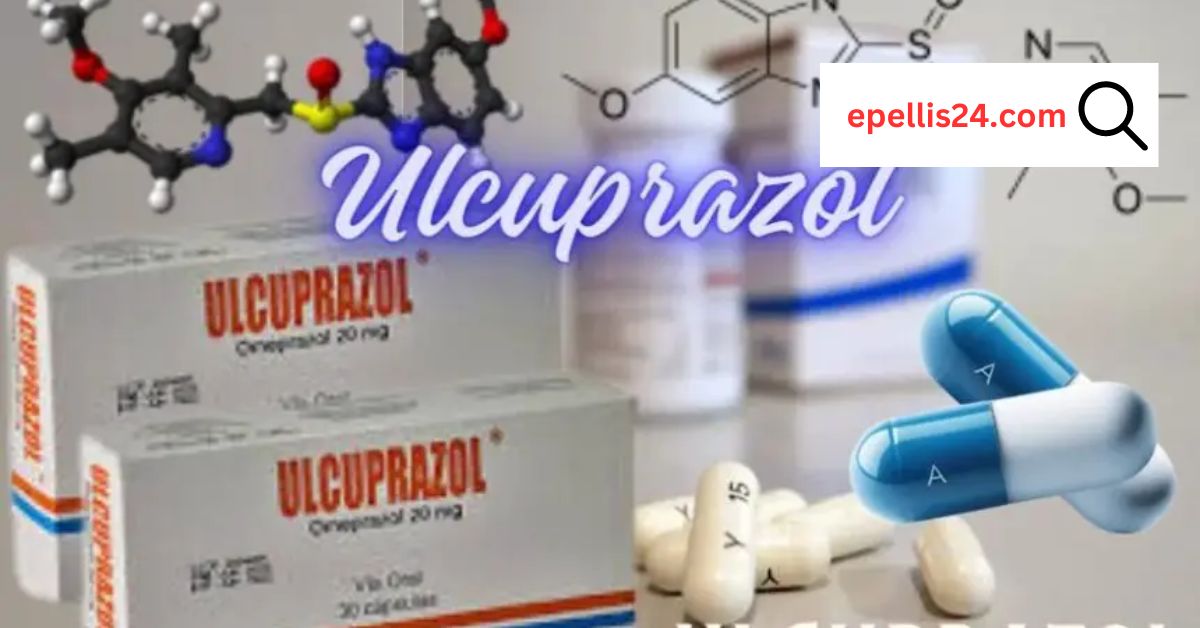Ulcuprazol emerges as a stalwart in the realm of pharmaceuticals, particularly noted for its efficacy in tackling gastrointestinal disorders.
Its widespread employment in medical practice underscores its significance, warranting a closer examination of its mechanism of action, benefits, dosage regimen, and potential side effects.
For both patients and healthcare professionals, comprehending these facets is paramount to ensuring informed decisions regarding its usage.
Understanding Ulcuprazol Mechanism:
At the crux of Ulcuprazol’s pharmacological prowess lies its classification as a proton pump inhibitor (PPI).
Functionally, it operates by thwarting the synthesis of stomach acid orchestrated by specific cells within the stomach lining.
This pivotal mechanism serves to curtail acidity levels, thereby fostering the amelioration of ulcers and assorted gastrointestinal maladies.
Benefits of Ulcuprazol:
Ulcuprazol’s repertoire of benefits is extensive and consequential. Foremost among these is its remarkable capacity to assuage symptoms associated with hypersecretion of stomach acid.
From the throes of heartburn to the complexities of acid reflux and gastric ulcers, Ulcuprazol emerges as a reliable antidote, offering respite from the debilitating manifestations of excessive acidity.
Furthermore, its proactive stance in averting ulcer recurrence underscores its proactive role in fortifying gastrointestinal resilience.
Ulcuprazol Dosage Regimen:
Navigating the labyrinth of pharmaceutical dosage intricacies necessitates a judicious approach, and Ulcuprazol is no exception.
The recommended dosage of Ulcuprazol hinges upon various factors, including the severity of the condition, individual patient characteristics, and the presiding healthcare provider’s directives.
Adherence to prescribed dosages is imperative to harnessing Ulcuprazol’s therapeutic potential optimally.
Potential Side Effects of Ulcuprazol:
As with any pharmacological intervention, the administration of Ulcuprazol is not devoid of potential side effects. While the incidence of adverse reactions is relatively rare, vigilance remains paramount.
Possible side effects encompass a spectrum ranging from mild manifestations such as nausea and headache to more pronounced anomalies like gastrointestinal disturbances and allergic reactions.
Prompt communication with healthcare providers in the event of untoward symptoms is pivotal to mitigating any emergent concerns.
Efficacy in Gastric Ulcer Healing:
One notable aspect that merits further elucidation is Ulcuprazol’s efficacy in promoting the healing of gastric ulcers. Beyond merely alleviating symptoms, Ulcuprazol exerts a profound influence on the underlying pathology of ulcers.
By staunchly inhibiting stomach acid production, it creates an environment conducive to the repair and regeneration of ulcerated tissues.
This proactive stance not only accelerates the healing process but also mitigates the risk of ulcer exacerbation, fostering sustained relief and bolstering gastrointestinal integrity.
Long-Term Management Considerations:
A crucial facet often overlooked is the role of Ulcuprazol in long-term management strategies for chronic gastrointestinal conditions.
In scenarios where recurrent ulceration or chronic acid reflux poses persistent challenges, Ulcuprazol assumes a pivotal role in maintaining symptom control and averting disease progression.
Its sustained efficacy, coupled with a favorable safety profile, renders it an indispensable component of comprehensive treatment regimens aimed at fostering sustained gastrointestinal well-being.
Interactions with Concomitant Medications:
Navigating the intricate landscape of drug interactions is paramount, particularly concerning patients with complex medication regimens. In this regard, understanding Ulcuprazol’s potential interactions with concomitant medications is imperative.
Notably, Ulcuprazol has been documented to interact with certain drugs, such as clopidogrel, potentially compromising the efficacy of the latter.
Healthcare providers must exercise prudence in assessing potential interactions and devising strategies to mitigate any untoward effects that may arise.
Patient Education and Empowerment:
Lastly, but certainly not least, lies the pivotal role of patient education and empowerment in optimizing Ulcuprazol therapy outcomes.
Empowering patients with comprehensive knowledge regarding Ulcuprazol’s mechanism of action, dosage regimen, potential side effects, and lifestyle modifications fosters a collaborative approach to care.
By fostering a sense of agency and fostering open communication channels, patients become active participants in their healthcare journey, thereby enhancing treatment adherence and overall therapeutic efficacy.
Emerging Research and Future Directions:
As the landscape of gastrointestinal healthcare continues to evolve, ongoing research endeavors seek to unravel novel applications and optimize existing therapeutic modalities.
In this vein, emerging research surrounding Ulcuprazol holds promise in elucidating its potential efficacy in novel indications beyond its traditional scope.
From exploring its role in the management of extraesophageal manifestations of gastroesophageal reflux disease to investigating its implications in the realm of functional gastrointestinal disorders, ongoing studies pave the way for paradigm-shifting insights and therapeutic innovations.
Pharmacoeconomic Considerations:
In the contemporary milieu of healthcare delivery, the integration of pharmacoeconomic considerations assumes heightened significance.
Assessing the cost-effectiveness and value proposition of pharmacotherapeutic interventions, including Ulcuprazol, is integral to informed decision-making processes.
Through rigorous cost-benefit analyses and comparative effectiveness studies, stakeholders can glean insights into the economic implications of Ulcuprazol utilization, thereby optimizing resource allocation and fostering sustainable healthcare delivery paradigms.
Global Accessibility and Equity:
Amidst the backdrop of global health disparities, ensuring equitable access to essential medications such as Ulcuprazol emerges as a pressing imperative. Addressing barriers to access, including financial constraints, logistical hurdles, and disparities in healthcare infrastructure, is paramount to realizing the overarching goal of universal healthcare coverage.
Collaborative efforts between policymakers, healthcare providers, pharmaceutical manufacturers, and advocacy organizations are indispensable in forging pathways towards equitable distribution and accessibility of Ulcuprazol, thereby transcending geographical boundaries and fostering health equity on a global scale.
Conclusion:
In conclusion, Ulcuprazol stands as a stalwart in the pharmacotherapeutic arsenal against gastrointestinal afflictions.
Its mechanism of action, elucidated by its classification as a proton pump inhibitor, underscores its pivotal role in assuaging symptoms and fostering gastrointestinal convalescence.
The array of benefits it confers, coupled with a prudent approach to dosage administration and vigilant monitoring for potential side effects, encapsulates the holistic paradigm governing its utilization.
For both patients and healthcare practitioners alike, an informed understanding of Ulcuprazol’s nuances is indispensable in navigating the complex terrain of gastrointestinal healthcare with efficacy and assurance.





